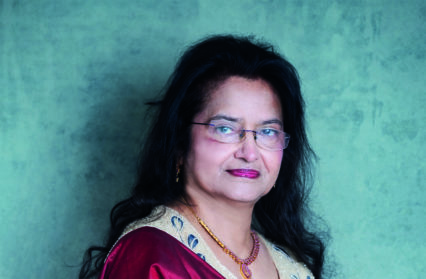Wales Arts Review continues their celebration of Parthian’s Seventy Years of Struggle and Achievement: Life Stories of Ethnic Minority Women Living in Wales with an essay from Indian classical music singer and performer Banani Sinha Ray. Here, she writes on the lessons learned and experiences won in the pursuit of music.
When we learn music, we not only learn music. We learn a lot of things like how to believe.
I was born in Calcutta, India. I grew up in my grandfather’s house in a village, together with my uncle’s family. I’m the second of four children, and my uncle had five, so there were nine children growing up together in a big house, which we called ‘Jora Bari’. We had a lovely time in childhood, and they were golden days for me, with open airfields and lots of gardens of flowers and fruits. In the summertime, we used to go swimming in the ponds.
My father was a doctor and always wanted me to be a doctor too, the way all Indian people want their children to follow in their paths. My mother was a housewife, but before she got married, she had been a singer and radio performer too. Growing up, there was always pressure for me to get married to a good husband, but my mother wanted me to be a singer and to be famous. Maybe she put her dream onto me, so I think I am what I am today with my mother’s blessing and pushing.
I was born into a very musical family, and everyone used to sing or play instruments. My father could play flute and tabla. My grandfather used to sing and play the harmonium. One of my uncles was a renowned musician and tabla player. He and another uncle, who played sitar, both attained the honorific title of Pandit for their talents. Another uncle was a classical vocalist and disciple of Pandit Narayan Rao Joshi, who used to come and stay for a month with us. In the summers, Kathak dancers from Banaras also used to come and perform, and I’d listen to them all the time, which is how my musical journey started.
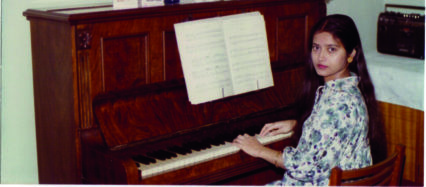
So, from my childhood, I was deeply immersed in music and always thrived to excel in the Indian classical style. My mother started teaching me to sing when I was six. Later, I trained in Kirana Gharana music, under the tutelage of a maestro, my guru, Pandit Biswanath Ghosh, who was a disciple of Ustad Amir Khan. I also trained with Manindra
Chandra Day and my uncle, Pandit Soroj Ray, who was a disciple of Ustad Keramatulla Khan, who taught me rhythm and was my mentor too. I used to go to different events with him to perform and am one of the winners of the 1979 All Bengal Competition in the Kayhal category.
I then conferred Sangit Probhakar and Sangit Bisharad music diplomas from the University of Allahabad and Chandigarh University, and having done science in school, I went for a BSc at the University of Calcutta. I began an MSc, which I later completed, and at the same time, my uncle put me in Rabindra Bharati University in Calcutta for an MA in music. When I was in Calcutta, I worked as a biology teacher for a while.
Then I got married through an arranged marriage and came to the UK, first to Derby, in the springtime, with all of the flowers, which I love. I was newly married and happy at the time. I had brought over my tanpura, a stringed instrument, but had always wanted to learn piano. So I learned for a few years and did up to Grade 5. My husband was a young doctor and quite busy and had to move around for training, so we moved to Wrexham, north Wales. My two sons were born in north Wales, and my brother came over, so we stayed there for a few years, but it was frustrating for me because there was no Indian culture there. I practised my music, but I had been performing and learning all the time in Calcutta, and I thought we would be going back.
It wasn’t so easy to go home because I was busy with the children, so I decided when I was in the UK, I’d give my children everything, so they could grow up nicely. But after ten years, I went back to India and stayed there for five years. My husband also came over for a few years, and my boys went to Calcutta International School.
The school had a British curriculum, but we later discovered that Calcutta University wouldn’t accept this, so after A levels, the boys wouldn’t have been able to pursue a professional career. So we decided it would be better for their education if we returned to the UK. We went first to north Wales and eventually settled in Cardiff. I did a three year degree course in computers and started to work for the NHS, but my mind was always on music. The whole office knew I was keen on music, and they all supported and encouraged me, as they’ve done until today.
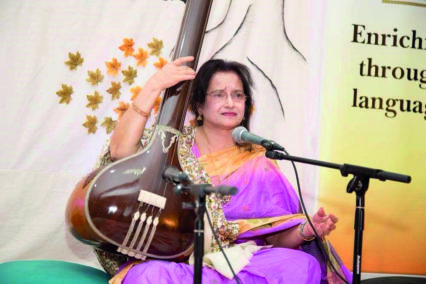
Bangladeshi and Indian people are quite interested in music, so I started teaching their children and adults as well. At one time, I had 25 pupils, but I thought it was too much, and my family was being neglected. Also, teaching can wreck your voice, so I cut it down. I still have twelve or thirteen pupils, and sometimes they disappear and come back again. Some of them are very good and very talented. There’s one autistic Bengali boy. When I first met him, he would just listen to me and copy, but now he can read notes. His mum got him a harmonium, and the next time I saw him, he was playing that. His main interest is bonding with the music and singing in Bengali, Hindi and Urdu.
I always think about young people, that if they learn and it’s gone to their heart, they can carry on our heritage and culture. When we learn music, we learn not only music. We learn a lot of things like how to believe. I think if children want to do something, they should go for it and be frank with their parents that they want to do this. In our time, it was difficult. Now, parents understand, and I notice if a child wants to do singing or play an instrument, parents arrange for their special training. Nowadays, there are lots of opportunities and competitions, and things are more open in the world, so if someone wants to do something, they should just carry on.
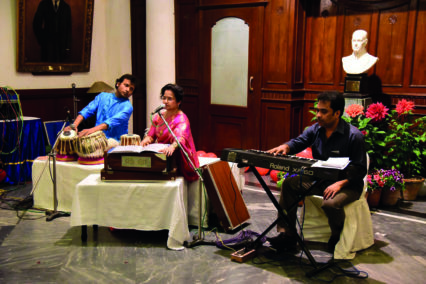
Some people from other communities or religions objected to some of the devotional songs, and I felt some threat for the first time after twenty years of being in Cardiff. Most of the songs in our Hindustani classical repertoire have names like Krishna or Shiva, so if you want to learn, you have to use those names. Now I always ask if people are okay with that, and most people don’t mind. I don’t have a problem with any religions’ songs and prayers—to me, it’s all the same thing.
Now, I have my own group called Aurav Disha MW, which means, ‘a direction of peaceful echo of multicultural Wales’. People have joined our group from all different communities, and our aims are to promote multicultural music and art, especially of young and local artists, and to provide a platform for diverse communities to perform together.
Our group has performed in several places in Cardiff, Bristol and London, and we hope there will be more opportunities in future. In 2019, we performed at an opening ceremony at the National Museum of Cardiff, alongside professional musicians from India, London and locally. I’ve also been performing quite a lot in places like Birmingham, Reading, Leicester, Bolton and Liverpool. In 2010, I performed at the Ananda Utsav Bengali and Indian Festival in London’s Alexandra Palace, where 6,000 people came. Over the threeday festival, there were topclass artists from all over India and Bangladesh, and I represented Wales.
I’ve also released various DVD albums—Bangla Melody in 2010, followed by AlorKhoje in 2012, which featured a song I composed myself. Anurager Rang, released in 2014, was an album of melody songs, and in 2016, I put out Chand Herichhe, with the legendary singer, Saikat Mitra. At the moment, I am working on another Hindi video album, and all of my album songs are telecast regularly on different TV channels in Calcutta. India is still very close to me, and I go every three to four months to Calcutta and do performances in different places, like the Calcutta Club and the Birla Academy of Art and Culture, as well as live television programmes.
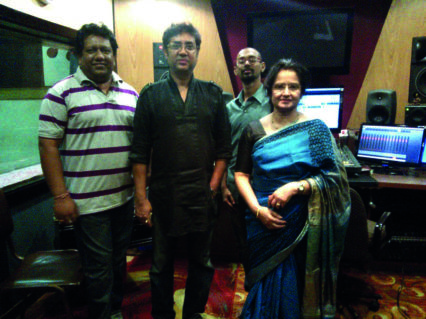
In Cardiff, I’ve been invited to present and perform at the Central Library on several occasions, which has given me opportunities to interact with Welsh people sharing mutual cultural interests and to increase the awareness of Indian classical music. One of these programmes entitled, ‘Vive— One City, Many Cultures’ had African, Chinese, Bangladeshi, Pakistani and Indian performers.
The author, Bruce Cardwell, also featured me in his photographic book, Noteworthy, about Welsh music, and in 2013, I won a WAWWA award for Arts and Culture, which was a surprise. As an artist, I work from my heart. I’m really introverted and don’t express myself to the public.
Wherever I’m going through life, I just go forward. I’ve had regrets, but I’ve got a good family and have always been supported by my husband. Both my children are doctors now. My elder son is a respiratory consultant at Imperial College, and the younger son is doing research on liver transplantation and the Hepatitis B vaccine at Addenbrookes Hospital, Cambridge University. He is also a very good painter and has done several exhibitions and has his own studio in London. They’re both very gentle and both love me very much, so at least in this way, I’m a winner.
Seventy Years of Struggle and Achievement is available via Parthian.


